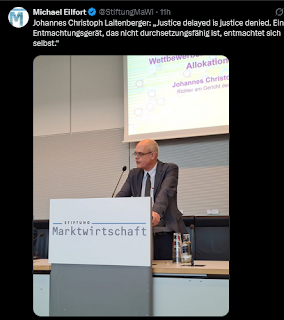Video
here.
Thank you for asking, Robin. This is my short answer but happy to discuss it further.
Concerning the very few words I loved just a bit less: the DMA is not enough, I quite agree, and it was never designed to work in splendid isolation. Competition law against Big Tech has been spectacularly ineffective, which rather invites the awkward question of whether it is even fundamentally capable of addressing the abusive exercise of economic power at all. Still, one could hope for reform, couldn’t one? That was the idea not so long ago. Now? Well, let’s say prospects are somewhat clouded: too much capture (and not just from the usual suspects: nostalgic lawyers clinging to familiar doctrines and IO economists with a keen eye for consulting fees aren’t exactly accelerating progress).
That said, change is seeping through, almost discreetly, from within the DMA’s own machinery: adjust your business model if necessary; unable to provide interoperability? We’ll happily spell it out for you; anti-steering? Surely you jest. And more will follow. Even judges seem to be taking notice, as the Auto Android ruling suggests.
Change is happening, slowly, admittedly, and perhaps depressingly so, given how history has picked up the pace of late. But still: this is democracy at work. And in the present political climate, it would be remiss not to say so.











